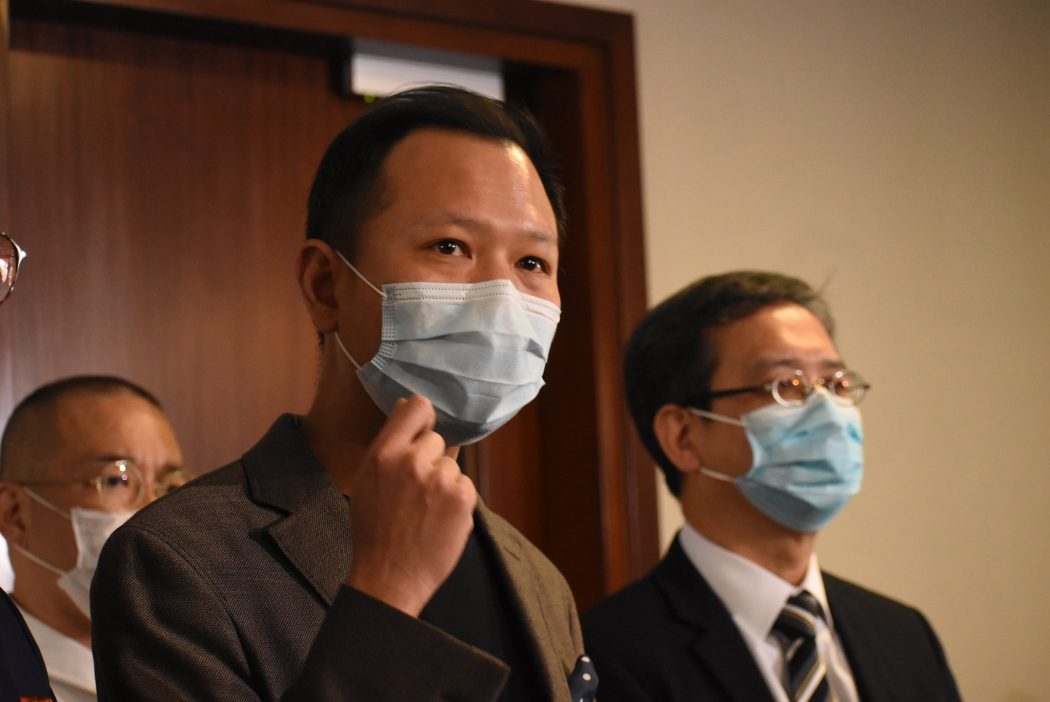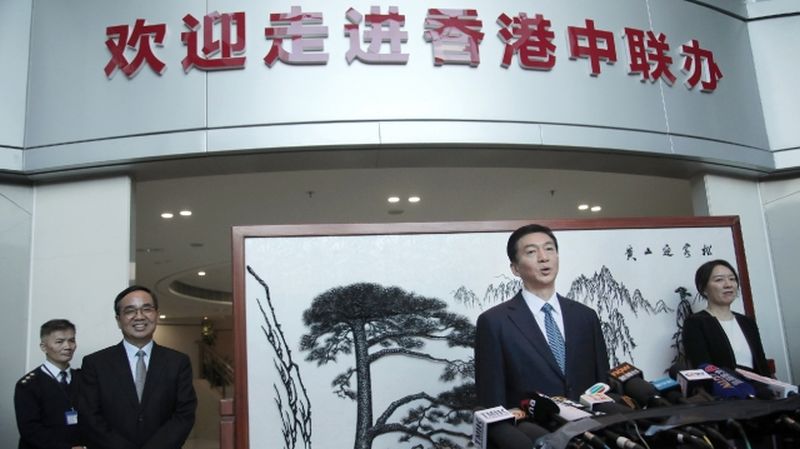With world’s attention focused on the coronavirus pandemic and protesters off the streets, Chinese and Hong Kong authorities stepped up their efforts to crack down on the pro-democracy movement in the semi-autonomous territory.

Over a span of just five days, the city saw its legislature, judiciary, legal system and civil society come under threat. HKFP summarises key events of the past week.
Attack on opposition lawmakers
On Tuesday, Beijing’s Hong Kong and Macau Affairs Office (HKMAO) and the China Liaison Office in Hong Kong launched a rare attack against the city’s opposition lawmakers, accusing them of “malicious filibustering” in an attempt to stall the election of the chairperson of the Legislative Council’s House Committee.
The Offices said that legal sector lawmaker Dennis Kwok, who presided over the House Committee meetings, and other democrats may be in breach their oaths and committing misconduct in public office.

An implication of the accusation, as suggested by Legislative Council President Andrew Leung, was that the Council could invoke Article 79 of the Basic Law, which enables the president to disqualify a lawmaker condemned for misbehaviour, or a breach of oath, by a vote of two-thirds of the council members.
The disqualification of lawmakers from office is not without precedent. The trend began in 2016 when Beijing handed down a controversial ruling to “interpret” Article 104 of the Basic Law to state that public officers must swear allegiance sincerely and solemnly. The decision resulted in the ousting of several opposition lawmakers who protested during their oath-taking ceremony.
Following Tuesday’s statements, the Bar Association urged the Offices to exercise restraint. Meanwhile, Chief Executive Carrie Lam dismissed public criticism that the Offices had attempted to interfere in the Legislative Council.
Alleged interference in judiciary
Also on Tuesday, news agency Reuters reported that Hong Kong’s judicial independence and rule of law had been threatened by Beijing’s interference, citing three anonymous senior judges. It also claimed that Chief Justice Geoffrey Ma had to contend with Communist Party officials’ stance that “the rule of law ultimately must be a tool to preserve one-party rule.”

In response, Ma said in a rare statement that he had not “at any stage encountered or experienced any form of interference by the Mainland authorities.”
Secretary for Justice Teresa Cheng dismissed the news report as “misleading” and cited Ma’s statement as evidence that Beijing did not meddle with Hong Kong’s judicial independence.
Meanwhile, all 30 representatives of the legal sector of the Chief Executive Election Committee, including the Bar Association Chair Philip Dykes, expressed “grave concern” over the allegation.
Renewed talk of national security law
On Wednesday, the China Liaison Office Director Luo Huining urged the Hong Kong government to step up its efforts to safeguard national security by strengthening legislation and enforcement.
Beijing’s top man in the city claimed that foreign forces had “deeply interfered” in Hong Kong’s affairs, though cited no evidence. He said the city’s legal system should be enhanced to avoid becoming a national security risk.

Carrie Lam also said that the Hong Kong government had a constitutional responsibility to protect national security.
Echoing Luo’s remarks, pro-China figures called for the implementation of Article 23 of the Basic Law, which requires the Hong Kong government to enact laws to prohibit acts of treason, secession, sedition and subversion against Beijing. Ever since its legislation failed in 2003 following mass protests, Beijing and Hong Kong authorities have periodically attempted to reignite talks over Article 23.
Status of Beijing’s offices redefined
On Friday, the China Liaison Office declared that it was not restricted by Article 22 of the Basic Law. The provision of the mini-constitution forbids any “departments of the Central People’s Government” to interfere in the internal affairs of Hong Kong. It also states that any offices set up by such departments must abide by local laws.
The Liaison Office claimed that it, and the HKMAO, were offices set up by the central government as opposed to being set up by “departments of the Central People’s Government,” thus falling outside Article 22. It said that, as representatives of Beijing, they had the right to monitor and comment on the city’s affairs.

The Hong Kong government issued a statement Saturday defending the Offices’ earlier remarks on the legislature as “legitimate,” while restating its position that the two organs were set up in accordance with and subject to Article 22. Shortly after that, however, it edited the text and removed the references to the impugned provision.
In the early hours of Sunday, the government issued another statement, fully adopting the China Liaison Office’s view. Meanwhile, local media unearthed a 2007 legislative document showing that the Liaison Office was indeed set up under Article 22.
Mass arrests
On Saturday, Hong Kong police arrested 15 high-profile pro-democracy politicians, advocates and activists on suspicion of organising and participating in a series of unauthorised assemblies that took place between August and October last year.
Veteran politicians and senior counsels Martin Lee and Margaret Ng, former chair of the Democratic Party Albert Ho, the Labour Party’s Lee Cheuk-yan and media tycoon Jimmy Lai were among those apprehended. The round-up also marked the first time that Martin Lee, 81, and Ng, 72 – both longtime critics of the Chinese Communist Party – were arrested.

The unauthorised assemblies the group were accused of organising were part of a months-long “leaderless” movement against a now-axed bill that would have enabled Hong Kong authorities to extradite suspects to their mainland counterparts. As of mid-March, more than 7,800 people had been arrested and over 1,200 prosecuted in connection with the mass protests and unrest, according to police figures.
The latest arrests drew strong criticism from human rights groups and international observers.
“With the world’s attention focused on the appalling covid-19 epidemic, Beijing and its subservient government in Hong Kong have taken yet another step towards burying one-country, two-systems,” Chris Patten, Hong Kong’s last colonial governor, said.
“This is not the rule of law. This is what authoritarian governments do. It becomes ever more clear, week by week and day by day, that Beijing is determined to throttle Hong Kong.”
